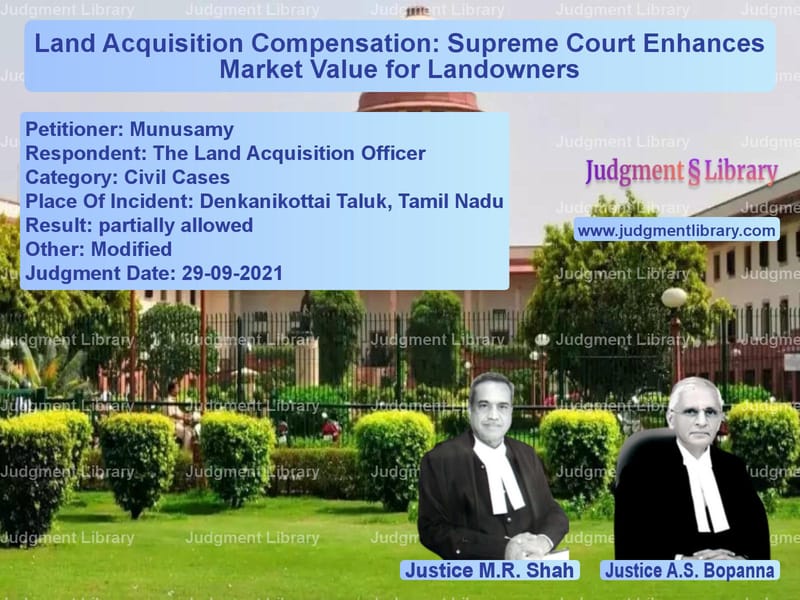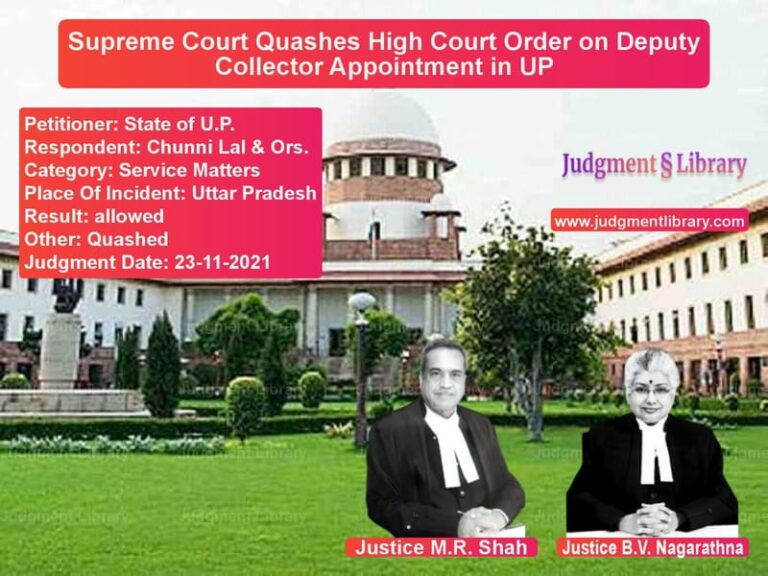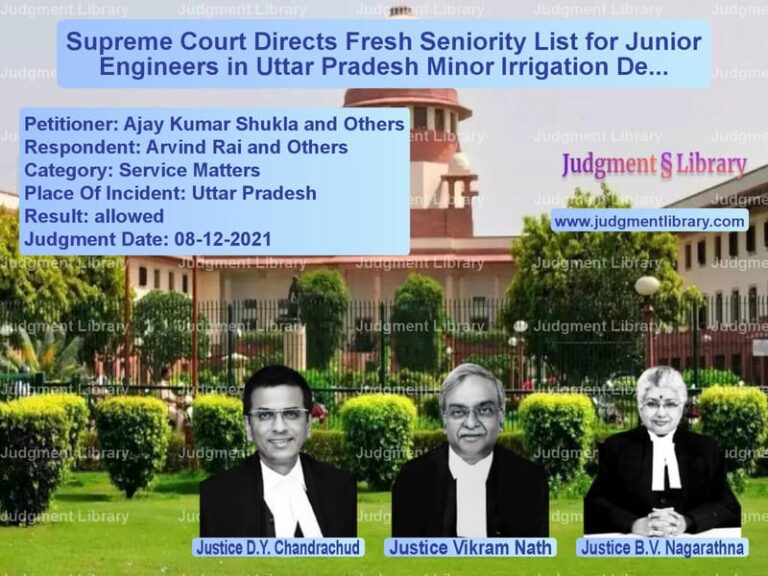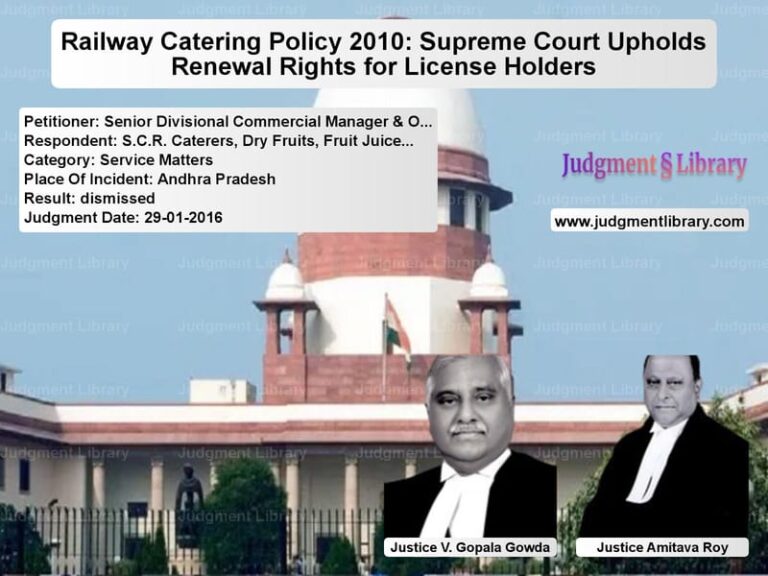Land Acquisition Compensation: Supreme Court Enhances Market Value for Landowners
The Supreme Court of India recently ruled on an important land acquisition compensation case in Munusamy vs. The Land Acquisition Officer. The case involved the acquisition of agricultural land in Anniyalam, Denkanikottai Taluk, Tamil Nadu, for a public purpose. The appellant, a landowner, challenged the compensation amount awarded by the High Court, arguing for a higher market value based on comparable sale transactions. The Supreme Court, after thorough consideration, partially allowed the appeal and enhanced the compensation.
Background of the Case
The case originated when the government issued a notification under Section 4 of the Land Acquisition Act, 1894, on September 27, 1990, for acquiring 0.73 hectares (1.80 acres) of land in Anniyalam village, Denkanikottai Taluk, District Dharamapuri, Tamil Nadu.
The Collector determined the compensation for the land at:
- Rs. 39,506 per hectare (equivalent to Rs. 16,000 per acre).
Unhappy with this valuation, the landowner sought enhancement through a reference under Section 18 of the Act. The Sub Judge, Hosur, acting as the Reference Court, significantly increased the compensation to Rs. 2,18,333 per acre. Dissatisfied with this amount, the Land Acquisition Officer appealed before the High Court of Madras.
Read also: https://judgmentlibrary.com/iit-admission-criteria-dispute-supreme-court-upholds-iits-policy/
High Court’s Ruling
The High Court partly allowed the appeal filed by the Land Acquisition Officer and reduced the compensation, setting it at Rs. 232.45 per cent. This led the landowner to approach the Supreme Court.
Arguments by the Petitioner (Landowner)
- The petitioner argued that the Reference Court had correctly determined the market value based on a comparable sale deed dated January 11, 1990, where a plot in the vicinity was sold for Rs. 2,977 per cent.
- He contended that the High Court wrongly discarded the sale deed (Ex.C1), which was a bona fide transaction.
- The petitioner submitted that the land was suitable for residential and commercial purposes, warranting a higher market value.
- He claimed that the compensation of Rs. 232.45 per cent awarded by the High Court was arbitrary and should be revised upward.
Arguments by the Respondent (State Government)
- The respondent countered that the sale deed (Ex.C1) was not a valid comparable since it involved a smaller land parcel (5.5 cents) and was executed between the landowner and a relative.
- The government relied on another sale instance (Ex.R2) involving a larger land area, where the price was significantly lower.
- It argued that the High Court had correctly determined the market value based on a broader dataset rather than an isolated high-value transaction.
Supreme Court’s Observations
The Supreme Court analyzed the evidence and noted:
- The sale deed (Ex.C1) could not be outrightly discarded simply because the buyer was a relative, as there was no evidence of a manipulated transaction.
- However, it acknowledged that the land in Ex.C1 was significantly smaller than the acquired land, requiring a reasonable deduction.
- The Court emphasized that while small-plot sales can be considered, they require appropriate deductions to account for large-area acquisitions.
- Given the peculiar circumstances, the Court applied a 60% deduction to the Ex.C1 transaction value.
Final Verdict
Based on its findings, the Supreme Court:
- Partially allowed the appeal.
- Fixed the final compensation at Rs. 1,191 per cent after applying a 60% deduction to the Ex.C1 rate.
- Ordered the respondent to pay all statutory benefits applicable under the Land Acquisition Act.
- Modified the Madras High Court’s judgment to reflect the revised compensation.
Implications of the Judgment
This ruling has significant implications for land acquisition cases:
- Consideration of Sale Deeds: Courts must carefully evaluate whether small-plot transactions can be considered for large-area acquisitions.
- Deduction for Bulk Sales: The decision reinforces the principle that high-value sales for small plots require appropriate deductions when applied to larger acquisitions.
- Balanced Approach: The judgment demonstrates a balanced approach in assessing fair compensation for landowners while ensuring reasonable valuation.
- Timely Compensation: The Court reiterated that landowners should receive compensation promptly, including all applicable statutory benefits.
Conclusion
The Supreme Court’s judgment in Munusamy vs. The Land Acquisition Officer marks a crucial step in ensuring just compensation for landowners. By adjusting the valuation using a fair deduction method, the Court has provided a structured approach to assessing market value in land acquisition cases. The ruling underscores the importance of judicial scrutiny in determining compensation and establishes a precedent for future land acquisition disputes.
Petitioner Name: Munusamy.Respondent Name: The Land Acquisition Officer.Judgment By: Justice M.R. Shah, Justice A.S. Bopanna.Place Of Incident: Denkanikottai Taluk, Tamil Nadu.Judgment Date: 29-09-2021.
Don’t miss out on the full details! Download the complete judgment in PDF format below and gain valuable insights instantly!
Download Judgment: munusamy-vs-the-land-acquisition-supreme-court-of-india-judgment-dated-29-09-2021.pdf
Directly Download Judgment: Directly download this Judgment
See all petitions in Damages and Compensation
See all petitions in Property Disputes
See all petitions in Judgment by Mukeshkumar Rasikbhai Shah
See all petitions in Judgment by A. S. Bopanna
See all petitions in partially allowed
See all petitions in Modified
See all petitions in supreme court of India judgments September 2021
See all petitions in 2021 judgments
See all posts in Civil Cases Category
See all allowed petitions in Civil Cases Category
See all Dismissed petitions in Civil Cases Category
See all partially allowed petitions in Civil Cases Category







